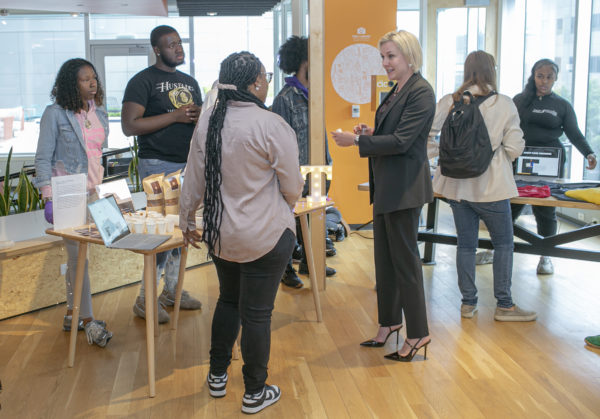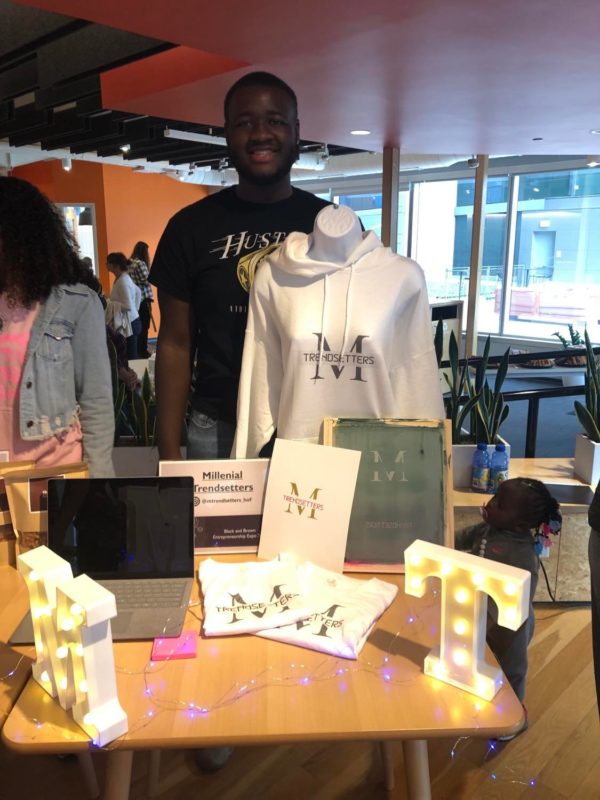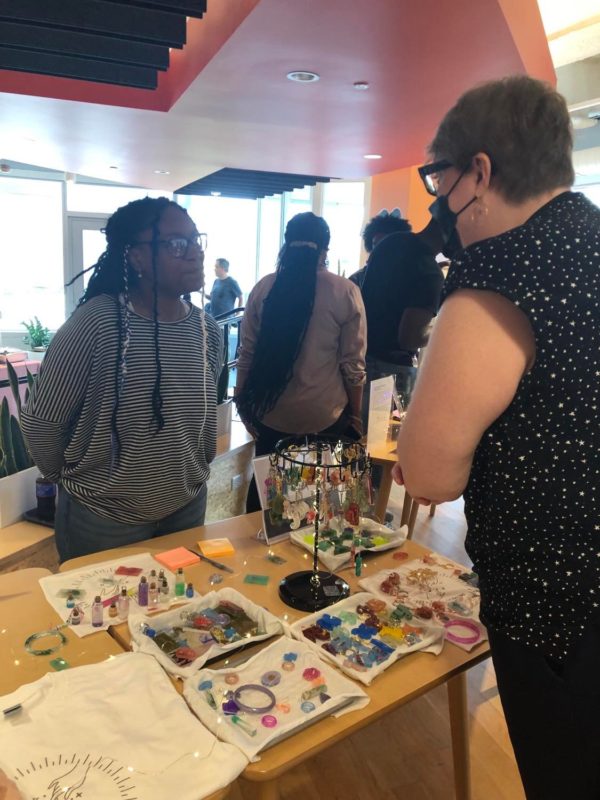Kennysha Stanley, 18, started her business in 2018 after her mentor asked his students to come up with a catchy phrase to put on their resumes. She didn’t know what to write at first, but settled on this powerful statement: “I’m the game changer.”
Four years later, that phrase has evolved into Game Changer Apparel, through which Stanley makes hoodies, shirts, pants, shorts and more featuring vinyl designs.
Stanley, along with her peers at the University City Science Center’s FirstHand Ventures program, showcased their small businesses at a Black and Brown Entrepreneurship Expo at Venture Cafe last Thursday. Alongside the heads of a few established Black and brown-owned businesses in Philly, the young entrepreneurs set up tables to showcase their products and talk to attendees about their work.
Tiffany Copeland, program coordinator for FirstHand, said the event was held to showcase all the students’ hard work, and the fact that they took what they learned in the STEM education program and transformed it into their own businesses. Her team especially wanted to hold an event because the students were not able showcase their work in person earlier in the COVID-19 pandemic.
Each student in the program was given a startup budget to use on product development and marketing needs. Copeland said much of the students’ businesses implemented the lessons they learned in FirstHand about environmental sustainability, branding, screen printing, mold making and the like — “all types of things that require hands-on STEM learning, and then they just took that and they ran with it,” she said. “So this is a very special, special, special group, special to my heart.”
The FirstHand Ventures program was started in 2020 and targeted FirstHand alumni who had previously completed one of the traditional life-science based curricula. Many of the young entrepreneurs have been with FirstHand since the 2018-2019 school year and are leaving for college soon, making the expo a bittersweet event for Copeland.
“They’re all just a really awesome group,” she said, “and to be able to see the impact that the program has had on their life over this four-year timeframe — it’s just, it’s amazing.”

Technical.ly interviewed six of the small business owners to get an idea of the joys and challenges of being a young business owner.
Stanley said she enjoys being a young entrepreneur specifically because people don’t expect it from her.
“They feel like because I’m young, that I don’t have the same capabilities as an adult,” she said. ‘That’s another reason why I push so hard with my business, because I don’t play about certain things.”
According to Stanley, when it comes to entrepreneurship, it doesn’t matter how old you are, or if you’re a child or an adult. What matters is how hard you work and how you spend your time. She said she enjoys running a small business because she can work at her own speed, on her own schedule, and be a positive influence on younger people.
Tyrese Prince, 18, runs a small business called Millennial Trendsetters House of Fashion. He said he started his own affordable clothing line when he noticed some kids at his school didn’t have access to the same quality clothes he did.
“I made it so that it could be at a good affordable price and it could be something cool that they feel comfortable in,” he said.
Prince said he wanted to be an entrepreneur because he always wanted to be a boss. This small business is stage one for him reaching that goal.

He noted that as a young entrepreneur, it’s important to have a support system, citing fellow program members Kennysha Stanley and Morgan Eason as part of his.
“I feel like that’s what drives your business, when you have a really great support system,” Prince said. “We’ve always been transparent and honest with each other. So without my support system, this would not be here today.”
Eason, 18, started a hair braiding business in 2020 during the pandemic. She said her mom does hair and her grandma does nails, so it was easy to run her business through their salon.
“The pandemic kind of had me a little down because there was nothing to do,” she said. “I kind of just put everything I learned from my program into my business and turned out to be really successful.”
She said running a small business is stressful because a lot of people don’t believe it’s possible at her age, but it’s important to let others — especially Black girls and boys — know they can do it, too. Even when she’s completely booked and has homework to do, she said she still enjoys having something to her name and working for herself. Eason plans to take her business with her when she goes to college this year so she can continue to make money while she’s in school.
Dani, 18, also started her business, The Falling Star, two years ago during quarantine. She received resources to get started from FirstHand and now sells resin charms.

She said running her own business is fun, but it can be difficult — “just finding the right time to do everything and selling everything and getting people to actually buy it.” Still, the experience is mostly a positive one because she likes the way her charms come out and enjoys the process of making them.
Erika, 18, and Mariam, 17, run a candle business called Gentle Glow, which they took over from Erika’s sister this summer. The two friends decided to take over the business because, as they put it, they didn’t have anything else going on. Why not try to make some money?
Erika said her favorite part about running a business is making money, while Mariam said her favorite part is meeting people and telling them about this business. However, they’re anticipating it being harder to handle the business once school starts again.
“It’s definitely hard since we’re still in high school,” Erika said. “I don’t know if it gets easier — hopefully it does. But yeah, it’s definitely lovely when people are like, ‘Oh, you’re a business owner at your age?’ Like, yes.”







